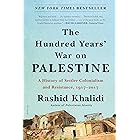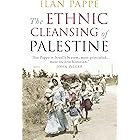| Digital List Price: | $23.99 |
| Kindle Price: | $14.99 Save $9.00 (38%) |
| Sold by: | Amazon.com Services LLC |
Your Memberships & Subscriptions

Download the free Kindle app and start reading Kindle books instantly on your smartphone, tablet, or computer - no Kindle device required.
Read instantly on your browser with Kindle for Web.
Using your mobile phone camera - scan the code below and download the Kindle app.

OK
 Audible sample Sample
Audible sample Sample 


Justice for Some: Law and the Question of Palestine Kindle Edition

Explore your book, then jump right back to where you left off with Page Flip.
View high quality images that let you zoom in to take a closer look.
Enjoy features only possible in digital – start reading right away, carry your library with you, adjust the font, create shareable notes and highlights, and more.
Discover additional details about the events, people, and places in your book, with Wikipedia integration.
Justice in the Question of Palestine is often framed as a question of law. Yet none of the Israel-Palestinian conflict’s most vexing challenges have been resolved by judicial intervention. Occupation law has failed to stem Israel’s settlement enterprise. Laws of war have permitted killing and destruction during Israel’s military offensives in the Gaza Strip. The Oslo Accord’s two-state solution is now dead letter.
Justice for Some offers a new approach to understanding the Palestinian struggle for freedom, told through the power and control of international law. Focusing on key junctures—from the Balfour Declaration in 1917 to present-day wars in Gaza—Noura Erakat shows how the strategic deployment of law has shaped current conditions. Over the past century, the law has done more to advance Israel’s interests than the Palestinians’. But, Erakat argues, this outcome was never inevitable.
Law is politics, and its meaning and application depend on the political intervention of states and people alike. Within the law, change is possible. International law can serve the cause of freedom when it is mobilized in support of a political movement. Presenting the promise and risk of international law, Justice for Some calls for renewed action and attention to the Question of Palestine.
“Careful and captivating . . . This book asks that the Palestinian liberation struggle and Jewish-Israeli society each reckon with the impossibility of a two-state future, reimagining what their interests are—and what they could become.” —Amanda McCaffrey, Jewish Currents
- ISBN-13978-1503613577
- PublisherStanford University Press
- Publication dateApril 23, 2019
- LanguageEnglish
- File size6836 KB
Customers who bought this item also bought
 Between 1972 and 2017, the United States used its Security Council veto forty-three times to shield Israel from international censure.Highlighted by 126 Kindle readers
Between 1972 and 2017, the United States used its Security Council veto forty-three times to shield Israel from international censure.Highlighted by 126 Kindle readers I argue that the law is politics: its meaning and application are contingent on the strategy that legal actors deploy as well as on the historical context in which that strategy is deployed.Highlighted by 95 Kindle readers
I argue that the law is politics: its meaning and application are contingent on the strategy that legal actors deploy as well as on the historical context in which that strategy is deployed.Highlighted by 95 Kindle readers Israel has insisted that the lack of a sovereign in the West Bank and the Gaza Strip in 1967 means that those territories cannot be considered occupied, as a matter of law.Highlighted by 79 Kindle readers
Israel has insisted that the lack of a sovereign in the West Bank and the Gaza Strip in 1967 means that those territories cannot be considered occupied, as a matter of law.Highlighted by 79 Kindle readers
Editorial Reviews
Review
"In this elegantly written and carefully argued book, Erakat strikes a delicate balance that makes an important contribution to the scholarly literature on both Palestine and critical international law....[Her] clear-eyed analysis is not only an excellent account of the law and politics of the Palestinian struggle but also a remarkable and often inspiring assessment of the relationship between law and liberation."―Asla Bâli, Journal of Palestine Studies
"Through a brilliant and bracing analysis of the Palestine question and settler colonialism, Noura Erakat offers a compelling story of how the antinomies of structure and indeterminacy shaped international law and its possibilities. Justice for Some is a vital lens into movement lawyering on the international plane. At once tragic and inspiring, this book is a must-read for anyone interested in decolonization and the politics of international law."―Vasuki Nesiah, New York University, founding member of Third World Approaches to International Law (TWAIL)
"Erakat's detailed analysis paints a dismal reality, yet it is one that must be acknowledged and worked from. Her meticulous discussion on the inherent injustice in international law propels attention towards what so far remains overlooked and calls the reader to reflect upon action that veers away from what the international community keeps demanding of Palestinians."―Ramona Wadi, Middle East Monitor
"Noura Erakat brings a sophisticated understanding of the role of international law over the last century in the Question of Palestine. This brilliant book will be of great interest to anyone seeking to understand why the outcome, thus far, to the disposition of the Palestine problem has not been a just one."―Rashid Khalidi, author of The Hundred Years' War on Palestine: Settler-Colonial Conquest and Resistance, 1917-2017
"Erakat's critical perspective on international law and the focus on how Palestinians have used it to support their cause is a much-needed addition to the international law literature on the Israeli–Palestinian conflict....This is a book brimming with acute insights that deserves the widest possible readership."―Markus Gunneflo, Journal of Conflict and Security Law
"A radical rethinking of the role of law and legal advocacy in the struggle for Palestinian rights. Noura Erakat tells how a refugee problem became a national liberation movement, and the tragic story of how initiative and momentum were squandered after Oslo. Brilliant, inspiring, coldly realistic―and hopeful."―Duncan Kennedy, Carter Professor of General Jurisprudence Emeritus, Harvard Law School
"Anyone wondering how and why international law has failed so miserably to curb Israeli violations in Palestine and the deleterious effect this has had on the law itself should read this book. Noura Erakat communicates...with the skill of a lawyer and the passion of an activist. Justice for Some is both enriching and inspiring."―Raja Shehadeh, founder of Al-Haq, author of Where the Line Is Drawn: A Tale of Crossings, Friendships, and Fifty Years of Occupation in Israel-Palestine
"Erakat's dissection of these legal and political histories is careful and captivating....This book asks that the Palestinian liberation struggle and Jewish-Israeli society each reckon with the impossibility of a two-state future, reimagining what their interests are―and what they could become. In rejecting the zero-sum formula's inevitability, Erakat sees, and demands, an alternative."―Amanda McCaffrey, Jewish Currents
"[Erakat] meticulously reveals how Israel ignored international law, the laws of war, duties of an occupying power, and efforts brought through the United Nations to censure its actions....The book will interest those concerned with the law and ethics of war, international law, terrorism laws, and observers of the Israeli-Palestinian conflict and its treatment by international bodies. Highly recommended."―S. Zuhur, Choice
"Without any doubt, Justice for Some is the best book on the law and politics of the Palestine/Israel struggle―sophisticated, learned, humane, and creative. Noura Erakat makes a profound contribution to our general understanding of the paradoxical role of law in the contemporary world."―Richard Falk, Former UN Special Rapporteur for Palestine, author of Palestine's Horizon: Toward a Just Peace
"Noura Erakat's incisive exploration of the role of law in shaping the development of Israel/Palestine reveals the consistent genuflection of international legal institutions to Israel's reliance on well-established colonial practices. She also forcefully argues that the skillful use of international law as a tool of struggle can be generative of hope and possibility―for Palestine and the world. Justice for Some is precisely the book we need at this time."―Angela Y. Davis, author of Freedom Is a Constant Struggle: Ferguson, Palestine, and the Foundations of a Movement
"That international law is not an effective starting point for achieving justice in Palestine is a vital insight for leftists developing a progressive foreign policy.Justice for Somemakes clear that winning Palestinian freedom will require confronting the geopolitical power structure that gives international law its meaning."―Gunar Olsen, Jacobin
"[A] major scholarly contribution to the critical literature devoted to resolving the Israel/Palestine struggle in line with the dictates of justice....[I] urge a careful reading of Justice for Some by all those interested in the Palestinian struggle as well as those curious about the way law works for and against human wellbeing."―Richard Falk, Mondoweiss
"Noura Erakat eloquently shows that, yes, the Israeli state project has been consolidated and expanded on a platform of might making right since 1948―but not only that. Israeli governments have also actively sought to craft legal justifications for the conquest and colonisation of territory, and to harness international law in their favour....[Erakat] has written a book that is a story of Palestine but is also a story of international law itself. Some of its most important insights are more universal than specific. They are major conceptual contributions with value well beyond the immediate case study."―John Reynolds, Dublin Review of Books
About the Author
Product details
- ASIN : B07P7X1ZQ5
- Publisher : Stanford University Press (April 23, 2019)
- Publication date : April 23, 2019
- Language : English
- File size : 6836 KB
- Text-to-Speech : Enabled
- Screen Reader : Supported
- Enhanced typesetting : Enabled
- X-Ray : Not Enabled
- Word Wise : Enabled
- Sticky notes : On Kindle Scribe
- Print length : 451 pages
- Best Sellers Rank: #328,427 in Kindle Store (See Top 100 in Kindle Store)
- #23 in International Law
- #96 in Foreign & International Law
- #210 in History of Israel & Palestine
- Customer Reviews:
About the author

Discover more of the author’s books, see similar authors, read author blogs and more
Customer reviews
Customer Reviews, including Product Star Ratings help customers to learn more about the product and decide whether it is the right product for them.
To calculate the overall star rating and percentage breakdown by star, we don’t use a simple average. Instead, our system considers things like how recent a review is and if the reviewer bought the item on Amazon. It also analyzed reviews to verify trustworthiness.
Learn more how customers reviews work on Amazon-
Top reviews
Top reviews from the United States
There was a problem filtering reviews right now. Please try again later.
The main target of Professor Erakat’s assault is the 1922 British Mandate for Palestine (the BMP), the League of Nations law that enabled the creation of the State of Israel. The professor declares that the BMP institutionalized a “racist,” “settler-colonial,” “Apartheid regime” of “oppression” dedicated to the “juridical erasure” of the Palestinian people. Equally extreme is her view of the Oslo Accords, the set of agreements signed by Israel and the Palestinians in the 1990’s to resolve their longstanding feud. She condemns the Oslo peace process as a continuation of oppressive “colonial practices.”
To combat the alleged colonial oppression, Professor Erakat recommends worldwide “resistance,” described as a blend of economic and legal activism against Israel. These “coercive pressures,” she contends, would reverse the legal injustices of the past, “dismantle” Israel’s “illegal … colonial infrastructure,” and “liberate” Palestine.
Erakat champions two related forms of resistance: the BDS movement, a boycott campaign “aimed at isolating and shaming Israel;” and “lawfare,” the use of legal tactics to damage a political enemy. She agrees with BDS leaders that all Palestinians should be allowed to relocate to Israel under a supposed “right of return.” Regrettably, she omits the fact that such a novel population shift would make Israel a majority-Arab state. Even more disturbing, she enjoys hinting at the prospect of “Palestinian sovereignty” over Israel. Although the professor maintains that “armed struggle” is available to Palestinians “as a matter of legal right,” she considers BDS and lawfare more effective.
Professor Erakat is not the first Palestinian to assail Israel with the debunked Marxist rhetoric of oppression and resistance. The Palestine Liberation Organization has been spewing the same hate-filled jargon since its founding in 1964. The only difference between the two manifestos is that one would annihilate Israel through terrorism while the other would do the job through the cynical weaponization of economics and law.
Mainstream scholarship on the BMP confirms the mandate reflected a valid recognition of Jewish self-determination, not an act of colonial oppression. The law was approved unanimously by a vote of all League of Nations members, not just the “colonial powers.” The great powers did not even share a common political goal, let alone a scheme of oppression. They competed shrewdly for influence over the territories subject to the League’s mandate system. Great Britain, the empire that most actively prepared the Jews for statehood, soon became the movement’s most powerful opponent. Moreover, the Jews could not participate in the League’s BMP vote because they lacked membership in the world body.
Far from serving as agents of any colonial hegemons, the early Zionists immigrated to Palestine to escape the persecution of those regimes. Another 800,000 Jewish immigrants came to Palestine from the Arab world, including the Jordanian-occupied East Jerusalem and West Bank, where they had suffered a brutal ethnic cleansing. Jews from all hemispheres migrated to the “Land of Israel” because that was their ancestral home. There, they supplemented indigenous Jewish communities much older than the region’s first Arab dwellings.
Middle East Arabs won the greatest share of mandatory bequests. They gained four large new states: Lebanon; Syria; Iraq; and Transjordan (present day Jordan). By contrast, their Jewish neighbors had to settle for a much smaller tract because Great Britain reallocated 77% of their League-designated territory to create Transjordan. The Arabs could have celebrated their vast, newfound sovereignty. But instead, in 1948 they waged a five-state military jihad against Israel and grabbed portions of the Jewish foothold for themselves. That illegal offensive was the real “oppression” that turned the BMP border-drawing exercise into perpetual ethnic strife.
As an international lawyer, Professor Erakat must realize that expunging Israel through terrorism or any other manner would violate the animating principle of the United Nations. Article 2 of the UN Charter requires nations to settle their differences “by peaceful means” without harming the “sovereign equality,” “security,” “territorial integrity,” or “political independence” of any state.
As a human rights lawyer, Erakat should know better than to portray the existence of Israel as a racist endeavor. That unfounded charge constitutes antisemitism as defined by the International Holocaust Remembrance Alliance and officially recognized by the US, Canada, 24 EU member states, and five other state signatories. She compounds the human rights affront by endorsing the BDS movement. A September 23, 2019 UN report titled “Elimination of all Forms of Religious Intolerance” determined that BDS is a form of antisemitism.
A less biased study of legal claims in the Israeli-Palestinian conflict would have considered both sides of the debate. The author would have acknowledged Israel’s indigenous rights, self-determination rights, and sovereign rights to the territories in dispute. She would have weighed possible remedies for the Jewish refugees from East Jerusalem and the West Bank. And she would have backed at least one legal measure to curb terrorism. Sadly, “Justice for Some” demands justice only for Palestinians.













